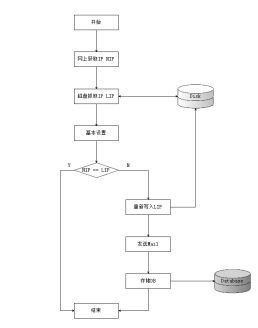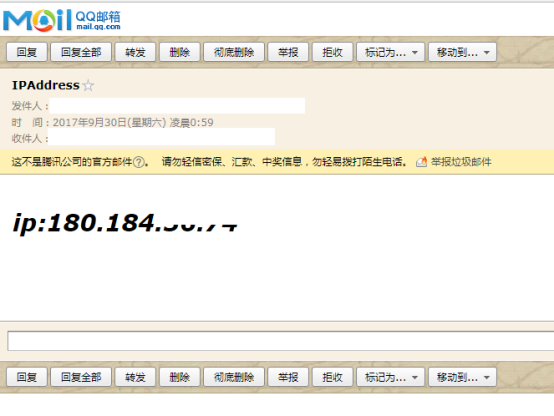下面小编就为大家带来一篇Python之自动获取公网IP的实例讲解。小编觉得挺不错的,现在就分享给大家,也给大家做个参考。一起跟随小编过来看看吧
0.预备知识
0.1 SQL基础
ubuntu、Debian系列安装:
root@raspberrypi:~/python-script# apt-get install mysql-server
Redhat、Centos 系列安装:
[root@localhost ~]# yum install mysql-server
登录数据库
pi@raspberrypi:~ $ mysql -uroot -p -hlocalhost Enter password: Welcome to the MariaDB monitor. Commands end with ; or \g. Your MariaDB connection id is 36 Server version: 10.0.30-MariaDB-0+deb8u2 (Raspbian) Copyright (c) 2000, 2016, Oracle, MariaDB Corporation Ab and others. Type 'help;' or '\h' for help. Type '\c' to clear the current input statement. MariaDB [(none)]>
其中,mysql是客户端命令 -u是指定用户 -p是密码 -h是主机
创建数据库、创建数据表
创建数据库语法如下
MariaDB [(none)]> help create database Name: 'CREATE DATABASE' Description: Syntax: CREATE {DATABASE | SCHEMA} [IF NOT EXISTS] db_name [create_specification] ... create_specification: [DEFAULT] CHARACTER SET [=] charset_name | [DEFAULT] COLLATE [=] collation_name CREATE DATABASE creates a database with the given name. To use this statement, you need the CREATE privilege for the database. CREATE SCHEMA is a synonym for CREATE DATABASE. URL: https://mariadb.com/kb/en/create-database/ MariaDB [(none)]>创建数据表语法如下
MariaDB [(none)]> help create table Name: 'CREATE TABLE' Description: Syntax: CREATE [TEMPORARY] TABLE [IF NOT EXISTS] tbl_name (create_definition,...) [table_options] [partition_options] Or: CREATE [TEMPORARY] TABLE [IF NOT EXISTS] tbl_name [(create_definition,...)] [table_options] [partition_options] select_statement
创建数据库ServiceLogs
MariaDB [(none)]> CREATE DATABASE `ServiceLogs`
创建数据表
MariaDB [(none)]> CREATE TABLE `python_ip_logs` ( `serial_number` bigint(20) NOT NULL AUTO_INCREMENT, `time` datetime DEFAULT NULL, `old_data` varchar(50) DEFAULT NULL, `new_data` varchar(50) DEFAULT NULL, PRIMARY KEY (`serial_number`) ) ENGINE=InnoDB AUTO_INCREMENT=3 DEFAULT CHARSET=latin1
表内容的查询
MariaDB [ServiceLogs]> select * from python_ip_logs; Empty set (0.00 sec)
0.2 python连接操作MySQL
模块下载安装
下载路径: https://pypi.python.org/pypi/MySQL-python
安装:
安装: 解压 unzip MySQL-python-1.2.5.zip 进入解压后目录 cd MySQL-python-1.2.5/ 安装依赖 apt-get install libmysqlclient-dev 安装 python setup.py install 如果为0则安装OK echo $?
连接Mysql
root@raspberrypi:~/python-script# cat p_mysql_3.py #!/usr/bin/env python import MySQLdb try : conn = MySQLdb.connect("主机","用户名","密码","ServiceLogs") print ("Connect Mysql successful") except: print ("Connect MySQL Fail") root@raspberrypi:~/python-script#如果输出Connect Mysql successful则说明连接OK
Python MySQL insert语句
root@raspberrypi:~/python-script# cat p_mysql1.py #!/usr/bin/env python import MySQLdb db = MySQLdb.connect("localhost","root","root","ServiceLogs") cursor = db.cursor() sql = "insert INTO python_ip_logs VALUES (DEFAULT,'2017-09-29 22:46:00','123','456')" cursor.execute(sql) db.commit() db.close() root@raspberrypi:~/python-script#执行完成后可以mysql客户端SELECT语句查看结果
1.需求
1.1 需求
由于宽带每次重启都会重新获得一个新的IP,那么在这种状态下,在进行ssh连接的时候会出现诸多的不便,好在之前还有花生壳软件,它能够通过域名来找到你的IP地址,进行访问,这样是最好的,不过最近花生壳也要进行实名认证才能够使用,于是乎,这就催发了我写一个python脚本来获取公网IP的冲动。
实现效果:当IP变更时,能够通过邮件进行通知,且在数据库中写入数据
1.2 大致思路

1.3 流程图


其他代码均没有什么好画的
2.代码编写
2.1.1 编写python代码
getnetworkip.py
root@raspberrypi:~/python-script# cat getnetworkip.py #!/usr/bin/env python # coding:UTF-8 import requests import send_mail import savedb def get_out_ip() : url = r'http://www.trackip.net/' r = requests.get(url) txt = r.text ip = txt[txt.find('title')+6:txt.find('/title')-1] return (ip) def main() : try: savedb.general_files() tip = get_out_ip() cip = savedb.read_files() if savedb.write_files(cip,tip) : send_mail.SamMail(get_out_ip()) except : return False if __name__=="__main__" : main() root@raspberrypi:~/python-script#savedb.py
root@raspberrypi:~/python-script# cat savedb.py #!/usr/bin/env python import MySQLdb import os import time dirname = "logs" filename = "logs/.ip_tmp" def general_files(Default_String="Null") : var1 = Default_String if not os.path.exists(dirname) : os.makedirs(dirname) if not os.path.exists(filename) : f = open(filename,'w') f.write(var1) f.close() def read_files() : f = open(filename,'r') txt = f.readline() return (txt) def write_files(txt,new_ip) : if not txt == new_ip : NowTime = time.strftime("%Y-%m-%d %H:%M:%S", time.localtime()) old_ip = read_files() os.remove(filename) general_files(new_ip) write_db(NowTime,old_ip,new_ip) return True else: return False def write_db(NowTime,Old_ip,New_ip) : db = MySQLdb.connect("主机","用户名","密码","库名") cursor = db.cursor() sql = """ INSERT INTO python_ip_logs VALUES (DEFAULT,"%s","%s","%s") """ %(NowTime,Old_ip,New_ip) try: cursor.execute(sql) db.commit() except: db.rollback() db.close() root@raspberrypi:~/python-script#send_mail.py
root@raspberrypi:~/python-script# cat send_mail.py #!/usr/bin/env python import smtplib import email.mime.text def SamMail(HtmlString) : HOST = "smtp.163.com" SUBJECT = "主题" TO = "对方的邮箱地址" FROM = "来自于哪里" Remask = "The IP address has been changed" msg = email.mime.text.MIMEText(""" ip:%s
""" %(HtmlString),"html","utf-8") msg['Subject'] = SUBJECT msg['From'] = FROM msg['TO'] = TO try: server = smtplib.SMTP() server.connect(HOST,'25') server.starttls() server.login("用户名","密码") server.sendmail(FROM,TO,msg.as_string()) server.quit() except: print ("Send mail Error") root@raspberrypi:~/python-script# print ("%s" %(line),end='')3.效果
收到的邮件如下:

利用SELECT查看表,效果如下:

把脚本放入crontab中,让它执行定时任务即可
以上这篇Python之自动获取公网IP的实例讲解就是小编分享给大家的全部内容了,希望能给大家一个参考,也希望大家多多支持html中文网。
以上就是Python之自动获取公网IP的实例讲解的详细内容,更多请关注0133技术站其它相关文章!








